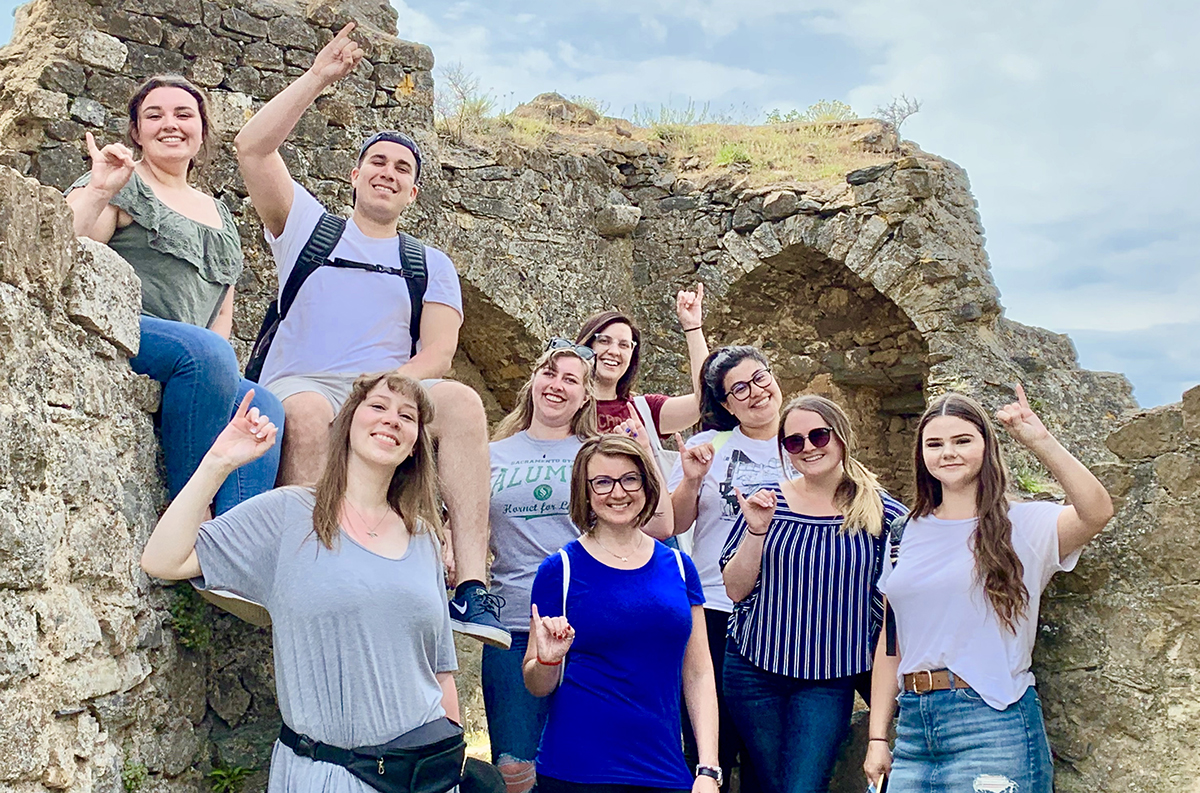 Sacramento State students (back, from left) Alexa Shaughnessy, Raymond Contreras, Rachel Marthaler, Katie Guest, and (front, from left) Analise Aguilar, Shelby Chaney, Lesya Ramanovich, Carly Carpenter. and Meg LaRiviere traveled last year with communication studies Professor Jacqueline Irwin to Labastide-Esparbairenque, last year, one of three short-term, faculty-led study-abroad programs offered this year. Fourteen such classes, including Irwin's, will be available to students in 2020. (Photo courtesy of Jacqueline Irwin)
Sacramento State students (back, from left) Alexa Shaughnessy, Raymond Contreras, Rachel Marthaler, Katie Guest, and (front, from left) Analise Aguilar, Shelby Chaney, Lesya Ramanovich, Carly Carpenter. and Meg LaRiviere traveled last year with communication studies Professor Jacqueline Irwin to Labastide-Esparbairenque, last year, one of three short-term, faculty-led study-abroad programs offered this year. Fourteen such classes, including Irwin's, will be available to students in 2020. (Photo courtesy of Jacqueline Irwin)
By Jonathan Morales
Savannah Bradley wanted to study in another country, but having never traveled internationally, she wasn’t sure a semester abroad was for her.
So when she saw that one of her criminal justice faculty members would lead a short-term summer trip to Ghana for course credit, she jumped at the opportunity to experience another country and culture.
"It was amazing. I almost wish it was longer,” said Bradley, a Sacramento State sophomore who has since changed her major to political science. “I feel like I learned so much in such a short period of time. And the way I learned it, being there and being immersed in the culture of Ghana, I could not have learned all of that just in the classroom.”
Next year, more students than ever will have an opportunity to study abroad, thanks to a substantial expansion of the University’s short-term, faculty-led study abroad programs from three to 14. That is expected to push the total number of Sacramento State students who spend time learning in another country to more than 350, a big jump from 78 students three years ago.
Short-term study-abroad programs help to remove a major barrier to going overseas for many students: the inability to leave home for several months at a time, for example, because they need to work or take care of a family member. Expanding the program means more students can benefit from the experience of traveling internationally, which in turn helps the region, according to Paul Hofmann, associate vice president for global engagement.
“Sacramento’s becoming more and more of a global player in international trade. That will continue as the city continues to grow,” Hofmann said. “More importantly, there is a personal benefit when someone experiences another part of the world and becomes a more critical thinker. Study abroad is a success in every way for any discipline.”
Held during academic breaks such as summer or winter intersession, short-term study-abroad classes span anywhere from one to three weeks and include about 12 students per trip. Each course is tied to an academic major, allowing participants to earn credit toward their degree. Students must pay for the trip out of pocket, but some financial aid is available.
Last year’s trip destinations included Matsuyama, Japan; Labastide-Esparbairenque, France; and Legon, Ghana. This year’s programs have expanded to include Peru; Beijing; London; Rome; Alwar and New Dehli, India; and Australia’s Gold Cost, among others. The programs are administered through the College of Continuing Education.
“My goal is to work with all of the academic colleges,” said Alessandra McMorris, a program management specialist with CCE who spent much of the year working with faculty to develop and add trips. “I want every college to add at least one program.”
Professor of Communication Studies Jacqueline Irwin led last year’s trip to France, a communication studies course held at a writer retreat and focused on a specific rhetorical theorist (Suzanne Langer last year, Joseph Campbell this year). Students read texts and articles, discussed them during class sessions, and also kept travel journals. A paper was due a few weeks after returning.
The bucolic setting in southern French provided an ideal environment for deep conversations about rhetorical theory, Irwin said. At one point, she gave students the night off – only to discover they were so engaged in the class that they were still talking about the reading.
"A lot of our students don’t have the means to take an entire semester out of their lives. That's important,” she said. “But it's also important that they go and do something to puts them outside of their comfort zone."
Emily Kyle, a senior criminal justice major, said traveling to Ghana opened her eyes to different and potentially better criminal justice practices, compared with the United States. Like Bradley, she had never been abroad and was eager to see another country, but had hesitations about spending an entire semester away. The short-term program provided her with the opportunity to travel.
During the class, she and her fellow students learned about the Ghanaian justice system, including witnessing an alternative dispute-resolution process and meeting with a member of the country’s Supreme Court. They also met and socialized with local law students, talking about differences in culture.
“I met a lot of cool people there who had different lives and experiences than me,” Kyle said. “It opened my eyes to what it's like to live somewhere other than where I've lived my entire life.”
More information about faculty-led study abroad can be found on the program's page on the Sac State website.
